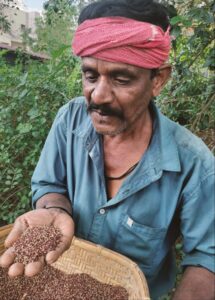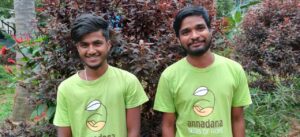Seed, Soil and Sangita, ‘a proud farmer’
Annadana is a successful and replicable model of a sustainable farm that feeds its community of farmers and conserves a wide variety of seeds.
Imagine a piece of land measuring two acres, right inside a buzzling metro. Visualise six varieties of banana, seven of mangoes, 79 of tomato, 32 of brinjal and 19 of okra, besides varieties of carrots and strawberries, etc. Now be informed that on this patch of land, some 10,000 species coexist.
That is Ishana in Gopathi farm in Bengaluru, steered by Sangita Sharma, chairman and founding trustee of Annadana Soil and Seed Savers Network. A corporate executive turned agriculturist, Sangita has completed 23 years of conserving seed and soil. Results have been mixed and slow in coming, but she is committed to the cause and is positive that the Annadana model of farms can be scalable and replicable. Annadana model was in fact chosen from 2000 others by the Antyodaya scheme of the government.
“We are solution providers and can transform any kind of soil, be it saline, drought, barren, chemical laden. It is no rocket science. My inspiration is the forest. If a forest can do it, so can we, with farming. We need less interference and less intervention,” she says, stressing that her organisation is knowledge-centric rather than input driven.
Annadana models show what a farm requires in terms of landscaping, and take the farmers through the entire process of sowing techniques from transplanting stages, after care, pest control, varietal purity maintaining, seed viability, seed to seed harvesting, drying and storage, Sangita informs.
The seed, to her, embodies history, diversity and culture and “we need to bring back farmers, especially the women who nurtured seeds, to overcome the agrarian crisis”. Soil quality is equally important as seed conservation, adds Sangita whose passion sparkles at the mention of either word.

Training the young farmers are Ashok Kamath and Sangita Sharma
Grabbing a fistful of mud from the earth, she reveals it much like a jeweller displays a treasure. “Today, they use a JCB to remove the entire topsoil that took hundreds of years to form. Just one inch takes 500 years. Now we level the land up, remove rocks and trees for a flat surface! Most of Punjab is like that and I was devastated to see mono-cropping of short duration of wheat varieties.”
At Annadana’s farms, the trees are allowed to be, and the cropping of varieties happens around them. The trees generate biomass in dried leaves which are used as mulch to protect the soil from harsh sunlight. Again, her emotions speak, as she likens soil to an expectant mother. “Will she expose her belly to the sun?”
Similarly on the topic of plastic and mulching done with plastic, a rampant practice that leads to the waste plastic regularly being burnt, Sangita brings in a comparison. It is toxic for the soil. Try keep your hand in a plastic cover for two days, she dares the farmers and scientists. “Soil biome is like human biome with similar physiology. Plastic mulch is lethal.” So also on the profligate use of chemicals, fertilisers and pesticides, she asks, “Who decided NPK? What if I give you kidney beans, spinach and rice the whole year? Protein toxicity will kill you. Soil biome is being killed by leftover chemicals from the wars and farmers made to believe that this fix is critical!”
Sangita next turns to faulty policies that have led to farmer suicides. “If you have heard about the human population touching 8 billion and that millions starve even today, do you know that the UN says there is food for 11.5 bn? Why are those who feed us left with no food? There is no disposable income, no state of art grain storage warehouses and it all shows sheer lack of political will.”
Agrarian crisis
The Green Revolution was needed at the time following Bengal famines but why was it continued? Pumping in so much chemical has killed the soil biome. Hybrid seeds and genetically modified seeds manipulated for traits are destroying native indigenous species, she avers. The seeds are sterile and the farmer has to keep going back for seeds! “We have demeaned our farmers’ and adivasis’ inherent sustainable farming skills and that has led to the agrarian crisis.”
Marvelling at the diversity on our food plate, Sangita informs us that tomato, capsicum and chilli originated from Latin/Central America, wheat from Persia, and rice in India. India had over 200,000 indigenous varieties once but now hardly 5000 exist, she sighs.
Even as one marvels at how informed she is, Sangita confesses that she has no formal degree in agriculture but picked up the knowledge working closely with nature and farmers. “The soil and plants talk to me. I know when they are sick or depleted. We just need to create a forest on the farm.”
The proof of Annadana’s teachings and Sangita’s convictions was evident during Covid. Stuck at Meghalaya during the lockdown, the team survived entirely on the “lockdown garden” they grew from the seeds they carried, and the rice and pulses they took along. “We eat what we grow. In fact, we at Annadana have been in lockdown since 2001,” says Sangita with her broad smile. The farm communities live entirely on farm produce and a mini dairy on site, with only salt outsourced!
Buried treasure
Among other activities, the team scours the country looking for seed varieties of regional crops.

Discussion time
During one such visit, Sangita recalls a particularly poignant incident. They were visiting farmers in the Garo Hills of Meghalaya and later Arunachal Pradesh.

Beaming with her treasure trove of seeds in hand
“At the home of an 89 year old woman, I showed her the images of a variety of corn. Her eyes lit up and I cannot forget that sight. She took me by hand into a little room and dug deep under mattress to bring out a rag full of seeds! With tears in her eyes, she gifted me her ‘treasure’ saying no one had ever come asking for this treasure. I assured her we would propagate the varieties of chillies, brinjal, greens, corn and millet in the region. We did exactly that. It was a most gratifying moment,” she notes while recalling a sloka from the Upanishads on the woman and seed.

Gopala thrilled to see seeds from his grandfather’s times!
Another gratifying instance was when she got back to the farm a variety of millet and Gopala, the farmer said the seed was at least 80 years old and he hadn’t seen it since his grandfather’s time!

Seed secure is food secure
The trust, which does not depend on any entity for its funds, derives its income entirely through its knowledge centric services like farm visits, produce and workshops held for farmers, students and others.
Seeds of sustainable thinking
Today, she is most proud of the fact that the children of the farmers are equal trustees of Annadana and carrying on its legacy. “In fact, the second generation of children drive our operations.”
Pawan Kalyan, 23 grew up with Annadana and is the admin trustee while Arun who is completing his degree will soon come on board. She sees hope in the green army of rural empowered youth who are being trained on the farms. A Young Indian Academy to train rural kids with skillsets and prevent migration to cities is next on the agenda.

The future of Annadana, the youth
Pawan’s sister Deepa is a good artist, having been trained in it. The walls at Gopathi display her colourful art and she is all set to dab the paint on the walls of the seed bank at Western Ghats. Vaishnavi at 12 is a good farmer and can run the tractor and tiller to help her dad. Young Anjali at 14 writes beautiful essays in English on sustainability on the farm.
“Our farmers fly with us. We use the income generated and use it for their comfort. Our farmers sit together with us at the dining table or at discussions. We are all partners in Annadana. That is the microcosm of democracy we have created. We jointly take all decisions with farmers, their trustee children, all together. This can be about fund allocation or recruitment. The feudal system needs to be done away with,” Sangita says vehemently.
We are what we eat!
Sangita is excited about the launch of a new concept — Foods that Heal. Her partner and managing trustee Ashok Kamat comes with blessed healing powers inherited from his mother. Ashok can feel the pulse and intuitively tell what ails the person. The prescription begins with removing blockages and pain points in arteries, veins and nerves and goes into deep tissue stimulation. However, unless the patient is open and willing to follow the foods prescribed and instructions calling for lifestyle changes, the healing may not work, cautions Sangita.
“We have moved away from ancestral wisdom. The foods, the combinations of groceries and grains, is all important. Why is our immunity failing us, even when eating home food?” Sangita says. Ashok has healed a wide range of ailments in people.
Journey so far
At Annadana, the focus has been to conserve indigenous heirloom species and revive seed saving skills for posterity. A unique insulated seed bank houses 1000s of heirloom seed species in the service of farmers and home gardeners.
Sangita is grateful to her dad, a visionary who bought the land in 60s and having served the army in military dairy farms took voluntary retirement. Rescuing cows burnt at a military farm, he got them to Gopathi farm. Growing up on the farm, Sangita remembers seeing hyenas and deers in the area which was like a forest. “Nature was my companion and I learnt to appreciate all things, whether it be soil or insects.”
Having dabbled in corporate sector, media, travel and fashion, Sangita would at the pinnacle of success feel a need to reinvent herself. “At whatever I worked, I always went to the crux of things. On one such travel across the country in a quest to see where food comes from, I was shocked to see the state of farmers and their dependence on seed companies. The exorbitant rates of seeds and unreasonable imported technology was doing them in.
“How can seeds disappear, why has the food equation gone wrong, these questions tormented me. I realised the need to revive the unassuming potent gift of life. It has been 23 years since then and it has been challenging but satisfying.”
Beginning at Auroville with a seed bank, the team was able to revive 500 acres of land following the tsunami. The next stint saw her team working with the Bio Centre in Hulimavu to create a chemical free seed production farm and seed bank of indigenous species to showcase sustainability. So also in parts of north east India where progressive farmers trained at Annadana now drive their own food secure farms. Food forest models have been replicated in Telengana and Punjab while seed banks were created in WG and parts of north India. Over a lakh farmers have trained at Annadana and over 5 lakh students visited the hands-on farm trails.
Annadana and Sangita have won many awards like Inspire 2019, Environment conservation award, Women achievers’ award, etc.
The progress
All this took roots at Gopathi where even today, the crops are grown for sustenance of the community and for seed creation. The Western Ghats Centre for Learning Sustainable Agriculture, or Celsa was launched eight years ago in a barren and drought-ridden land and today is a haven of diversity measuring 24 acres.

Creating ponds and helping to send water back to the forest
Being close to the Sharavathy reserve, the farm inspires farmers to move from chemical laden practices. Work is in progress to create a tropical seed bank to serve 15,000 farmers. By restoring natural springs and creation of ponds, Annadana has even been able to send water back into the forest.
Being close to a protected area, the region is home to porcupine, monitor lizards, lion faced macaques and others. The team has been struggling to drive home the message among the locals to stop hunting.
A caterpillar or a tadpole has its unique role to play, believes Sangita who narrates the capture and rescue of a huge owl that was stuck in a net when preying on chicken. Farmers are fined if caught killing any species and now they leave the snakes and wasps alone. Even as she calls out to a waddling duck by name, she mimics the grey hornbills at the Celsa farm, and proudly points to the wasps’ nest, crediting the pollinators for increasing the banana yield.
Finally, we can be food secure only when we are seed secure, concludes Sangita. Her small but passionate army of young farmers assent. What better a reward than to hear young Vaishnavi say, ‘I want to be like you, a proud farmer.”
(For details email to farmrelations@annadana-india.org)
Jaya
